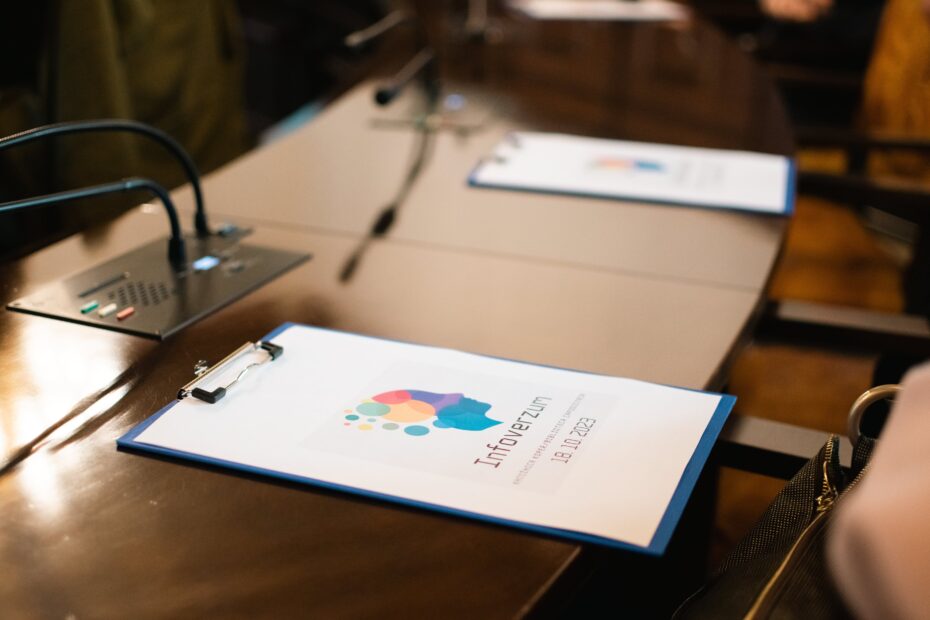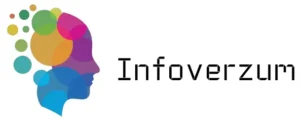On October 18, 2023, Srečko Vilhar Central Library Koper organized an international professional conference on information literacy and artificial intelligence under the name Infoverzum. The event, held at the Praetorian Palace in Koper, brought together experts in the fields of librarianship, digital and media literacy, and artificial intelligence.

The conference was opened by Luana Malec, Director of the Srečko Vilhar Central Library Koper; Marjan Gujtman, Secretary at the Ministry of Culture; and Andrej Erzetič from the Office for Digital Development and Office Management of the Municipality of Koper, who in their welcome addresses highlighted the importance of reading, information literacy, and successfully navigating the digital world.


The topics addressed were diverse and offered a rich insight into various aspects of the digital world:
Erik Novak from the Jožef Stefan Institute, Department of Artificial Intelligence, presented the basics of artificial intelligence — including supervised and unsupervised learning as well as generative models — and also provided practical guidelines and ideas for implementation that could improve library services. He highlighted cataloguing and metadata extraction, smart search, and the creation of recommendation lists with the help of artificial intelligence. He also addressed data storage, emphasizing GDPR and the ethical use of models. The title of his presentation was ‘The Role of Artificial Intelligence in Librarianship (and Vice Versa).’

Tjaša Jazbec presented ‘The Concept of Collective Intelligence and Practical Examples from the Business World,’ where she connected her studies at the MIT Sloan School of Management with real business cases. In her talk, she argued that fears of artificial intelligence taking over our jobs are unnecessary, since AI is primarily a tool that can greatly assist in improving work processes. The goal is an efficient division of tasks between computers and people according to their capabilities — for instance, machines are far better than humans at remembering vast amounts of information, while people are generally better at flexible interaction with other people.

Maja Drobne from the Cultural and Educational Association PiNA highlighted opportunities for European funding to support projects in the field of digital literacy and artificial intelligence. She presented the Erasmus+, CERV, and Creative Europe calls, with a particular focus on the Resourcing Libraries project, funded by Erasmus+. These programs are aimed at promoting active citizenship, digitalization, inclusion of diversity, and fostering sustainable development. She also successfully engaged the audience in her presentation, who interactively, by scanning a QR code, shared their main concerns and obstacles to applying for projects funded by European programs.

Uroš Ocepek, a teacher at the Secondary Technical and Vocational School Trbovlje (STPŠ Trbovlje), discussed ‘Artificial Intelligence in Education: A Teacher’s Superpower or the Greatest Threat?’ He uses artificial intelligence in teaching in three ways: as a subject of study, as a field for project assignments, and as a tool to support teachers in improving the quality of instruction. He presented his innovative work with students and several award-winning projects, which justify his representation of Slovenia in the Global Teacher Prize 2023. Under his mentorship, students developed innovative AI-related projects, including an online learning platform, algorithms for detecting personality patterns, and art created with the help of brain–computer interfaces.
Nada Čupković and Ksenija Zečević from the Adult Education Centre Koper presented the current state and future of ‘Information and Media Literacy in Lifelong Adult Learning.’ They discussed the concept of literacy and highlighted the role of adult education centres in creating high-quality educational programs for adults, aiming to empower them for independent learning, information seeking, and using knowledge to achieve their educational goals. They concluded their presentation with the thought that ‘[n]o one is so literate that they cannot become even more so.


Tina Saražin at the Srečko Vilhar Central Library Koper focuses, among other things, on working with high school students in the Municipality of Koper. At the conference, she presented how the media landscape affects them and emphasized that young people are the group we least often focus on in terms of digital literacy, as we mistakenly assume they already know everything about it. Young people are an important part of society, present online, and most of them obtain information primarily through social media. Therefore, it is crucial to involve them in discussions about the digital future, as they have much to contribute. She also presented international projects in which the Koper library actively participates, such as ADELE, Media Literacy Case for Educators, Glass Room, and What the Future Wants.

More about international projects aimed at strengthening information and digital literacy was shared by our guest speakers from abroad. Helderyse Rendall from Tactical Tech highlighted critical digital literacy for young people around the world, presented the ‘What the Future Wants’ project, and introduced new resources to support teachers and organizations, as well as approaches for working with youth. Claudia Matera, a creative specialist from ALL DIGITAL, shared her extensive experience in the fields of creative and cultural industries and education. She emphasized the role of games and gamification in education, and how new technologies can foster innovation and learning.
Marjan Marinković presented the development of an innovative model for media and digital literacy education in libraries through the lens of his experience at Biblioteka grada Beograda. He described various projects in which he is involved, including the Essential project, which contributes to the development of critical thinking and the strengthening of news literacy, and the Digiblend project, which uses gamified learning to improve digital literacy. As part of this, they developed social board games such as Infinity.net and an escape-room-style game. Marinković emphasized that the key to success is international, cross-sector collaboration, as joint efforts have enabled the development of adaptable models useful for knowledge assessment and civic education across various fields.

Tanja Oblak Črnič and Assistant Katja Koren Ošljak from the Faculty of Social Sciences shared their insights on youth media literacy in the age of social platforms. They presented the main findings of a quantitative study among primary and secondary school students — including how much time teenagers spend on smart devices, which social networks are most popular, and how they use these platforms. They also covered family rules regarding access to and use of smart devices, and whether parents guide them in this usage. In their concluding remarks, they emphasized the importance of critical thinking in today’s media landscape and entertained the audience with statements from teenagers recorded during focus group research.

Grega Repovš, an expert in psychology and cognitive neuroscience, presented how acquiring competencies in the era of generative artificial intelligence affects our cognitive structure. He focused on the interaction between the human mind and technology, emphasizing the need to understand brain functioning in the digital age. He highlighted that artificial intelligence can serve as a tool to assist in knowledge assessment, but warned that effective use requires a solid foundation of prior knowledge on the research topic.

During the event, it became evident that the digital age brings numerous challenges and opportunities for libraries and other educational institutions. The focus was on critical thinking, the role of artificial intelligence in society, and the need for international collaboration. Participants agreed that it is crucial to invest in education and research and to develop strategic approaches that address the needs of contemporary society.
Infoverzum 2023 proved to be an excellent opportunity for professionals in librarianship and information science to share their knowledge, experiences, and insights on contemporary trends and challenges in the digital age. Participants had the chance to listen to distinguished speakers, discuss important topics, and form connections for future collaboration. The event provided insight into how libraries and professionals can adapt to and take advantage of the opportunities presented by technological advancement.
Finally, at the Srečko Vilhar Central Library Koper, as part of the development of competency-based content, we plan to publish a proceedings volume with contributions from all speakers. It will be made available on a new website, through which we will inform librarians and users about the latest developments in artificial intelligence and information literacy, and provide engaging training and other resources.
Article published: LINK
Author: Tjaša Jazbec
Photographer: Urška Špende

